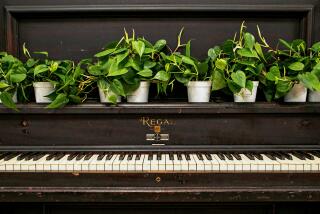Finckel and Han: A Felicitous Pairing
- Share via
Reportage from outdoor music concerts can tend to dip into the domain of weather reports, especially in a season so mercurial. We’re happy to report that, for cellist David Finckel and pianist Wu Han’s performance at the John Anson Ford Amphitheatre on Sunday morning, the weather behaved mildly, with a break in the heat a welcome relief. It was a fine way to close the new “Sunday at Brunch” chamber music series.
The only bothersome distraction, in the first half, was a clacking metal fitting on the overhead canopy, stirred, ironically, by the cool breeze. Music al fresco braves the elements, expected and otherwise. But when the music shines, as it did on Sunday morning, minor distractions are tolerable.
Family connections abounded here, without any cause for apology. Finckel, one-quarter of the respected Emerson String Quartet, and Han are sympathetic partners in music and marriage, and Finckel was featured as the performer and dedicatee of his composer father Edwin Finckel’s “Portrait.” Written 20 years ago, when his cellist son was a prodigy, it’s an unabashedly and sensitively wrought piece of post-Romantic writing, perfectly in keeping with the Romantic bent of the program.
This chamber music duo is an inspired pairing, conversant with the material and each other’s motions. Finckel makes his instrument sing with a natural eloquence, at once muscular and supple. Han, for her part, dispatches musical material without flinching, and without losing emotional mooring.
They brought assurance to the heroic panache and passages of refined conversational interplay in Beethoven’s Sonata in F, Opus 5, No. 1, and the 18-year-old Richard Strauss’ Sonata in F, Opus 6 continued the pattern: Its final movement moved easily from a playful dialogue to more intense provocation.
Grieg’s Sonata in A Minor, Opus 36 closed with its gust of folk-like bucolia, a lovable finale played by loving hands. For an encore, Shostakovich’s Scherzo offered a refreshing hint of modernity after the morning’s rigorous but full plate of romanticism.
More to Read
The biggest entertainment stories
Get our big stories about Hollywood, film, television, music, arts, culture and more right in your inbox as soon as they publish.
You may occasionally receive promotional content from the Los Angeles Times.










